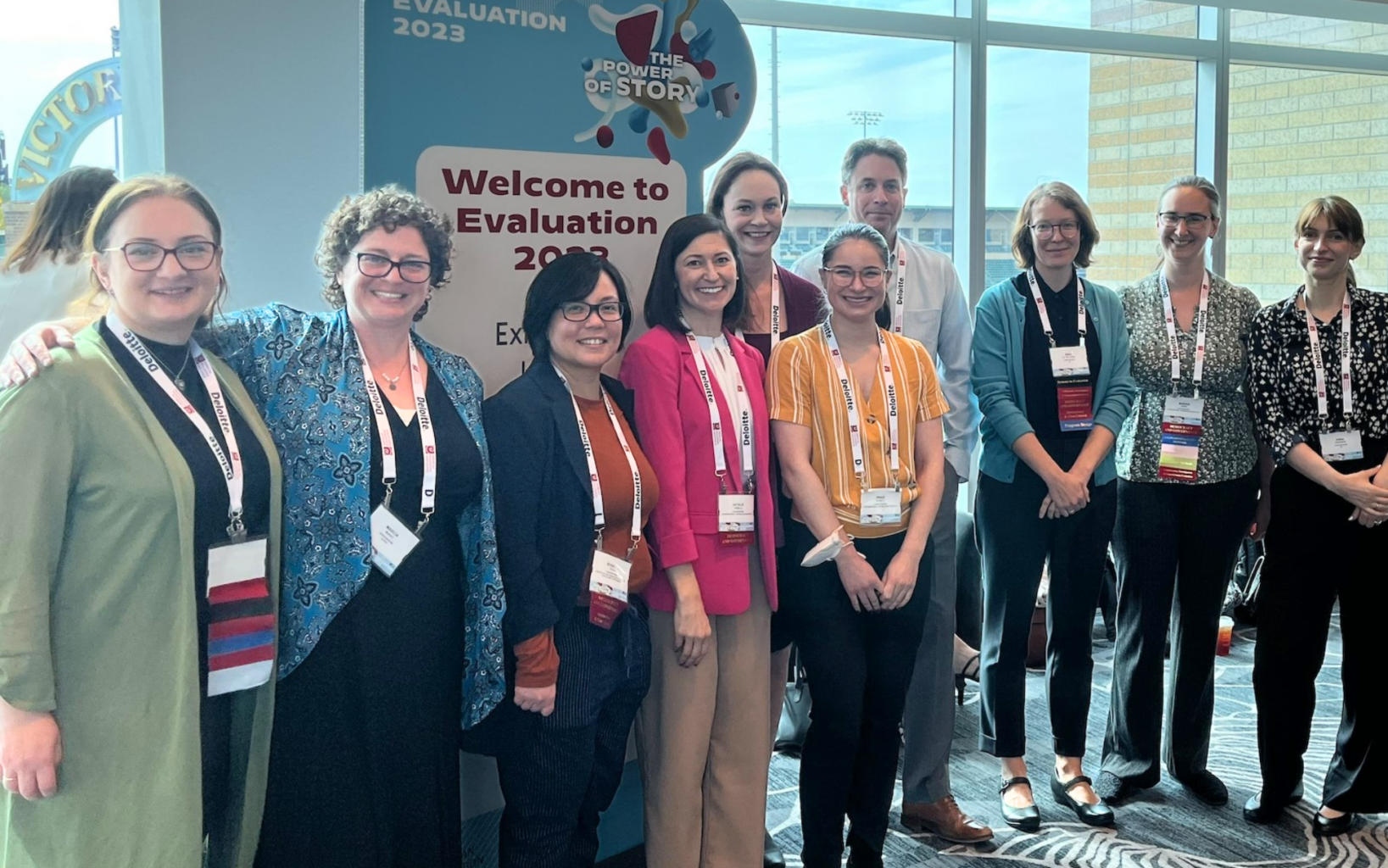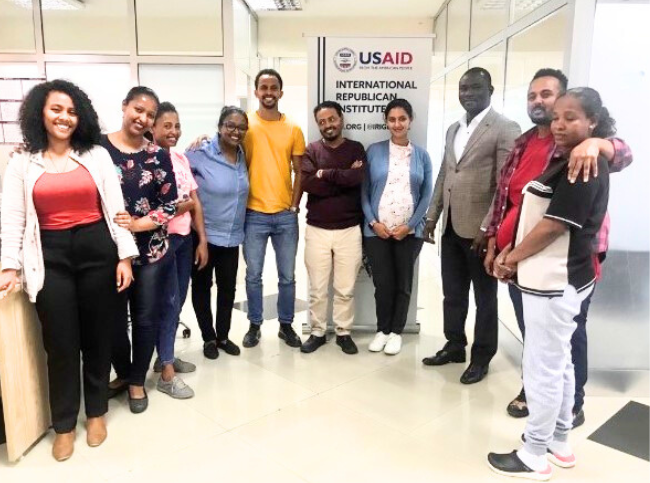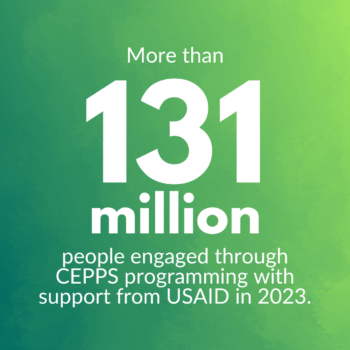To read this issue in its original format, click here.
Dear Colleagues,
We have seen many challenges for democracy in 2023 including armed conflicts, rising authoritarian regimes, and large-scale democratic backsliding. As members of the democracy, rights, and governance (DRG) community, our work to support healthy democracies, representative of all people is more important than ever.
As we close out the year, the Consortium for Elections and Political Process Strengthening (CEPPS) dedicates this newsletter to highlighting the consortium’s efforts to amplify our local partners’ voices as they work to end gender-based violence in North Macedonia, Zambia, Ethiopia, and other nations, where diverse men and women raised their voices during the “16 Days of Activism Against Gender-Based Violence Global Campaign”. We will also share how our local partners are dedicated to making their democracies more inclusive and DRG work more sustainable and connected to every other sector of their societies. Finally, we reflect on our efforts to increase understanding of the factors that contribute to democratic erosion and to share our experiences leveraging learning to build locally-owned, results-driven programs throughout the DRG community.
In the spirit of this enduring dedication to equality, freedom, and democracy, CEPPS together with our core partners, the International Foundation for Electoral Systems (IFES), the International Republican Institute (IRI), and the National Democratic Institute (NDI), support inclusive, resilient, and accountable democracies in all corners of the world. In partnership with the United States Agency for International Development (USAID), through the Democratic Elections and Political Processes (DEPP) cooperative agreement, CEPPS remains dedicated to working tirelessly with our local partners to support inclusive, sustainable, and flourishing democratic systems.
As 2023 comes to an end, all of us at CEPPS offer a profound thanks to those of you who continue to devote time, energy, and deep dedication to this shared mission.
Sincerely,
The CEPPS Team
To better understand democratic erosion and how to counter it, CEPPS and DEPP Senior Technical Partner Democracy Arch (D-Arch) created a collection of case studies in the brief titled, “Democratic Erosion and Authoritarian Consolidation”, with support from the USAID-funded DEPP cooperative agreement. This paper highlights how common issues like rising populism, increasing information control, and soaring inequality are linked to democratic erosion.
In the past few years, the number of liberal democracies around the world has declined, reinforcing the democratic erosion that’s trended for the past decade. According to Thomas Keck’s recent article “Erosion, Backsliding, or Abuse: Three Metaphors for Democratic Decline”, in 2021 alone, 33 countries became more autocratic, while only 15 became more democratic.
Worryingly, the D-Arch report finds that the current era of democratic erosion is unlike backsliding in past years. Rather than the loss of democratic nations through military coups, in many cases, today’s illiberalism is driven by elected leaders who often win their positions through free and fair elections. Only once in power do these leaders begin undermining their country’s commitment to electoral democracy by attacking democratic institutions.
This month, CEPPS was honored to have its partner Rosemarie Ramitt, a prominent young Guyanese disability rights activist, featured on USAID’s flagship platform, the Medium blog:
In Guyana, a chance meeting sparked a chain of events that sent Rosemarie Ramitt on a path she never imagined. “Twelve years ago, a disability rights advocate said to me, ‘You have incredible potential and I do not want to see you waste it,’” Rosemarie recalled. This idea transformed her thinking, and today it remains the driving force behind many opportunities that significantly changed her life and the lives of many other persons with disabilities in Guyana.
Today, Rosemarie is a disability rights advocate who worked with the USAID-supported Youth ALLIES program implemented by IFES to amplify voter education campaigns across Guyana, particularly focusing on increasing awareness among youth and people with disabilities.
In recognition of Rosemarie’s leadership, CEPPS invited her to join the 2023 DRG Cross-Sectoral Initiative Youth Advisory Group. In this group, she has worked with other young leaders from around the world to build skills and networks.

Have you gotten The Readout yet? Don’t miss the new video series, Democracy! The Readout, created by CEPPS with support from USAID. Each episode in this digital series travels to the front lines in the pursuit of democracy and captures first-hand accounts from some of the most seasoned experts in the field. The Readout is developed in partnership with CEPPS core partners, IFES, IRI, and NDI, and features many of the consortium’s treasured partners at home in their own neighborhoods, as they tackle real-life problems and strive to secure more democratic processes for all. Follow CEPPS TV on YouTube to never miss an episode!
Are you caught up on Democracy! The Podcast? Listen now, before new episodes are added! The entire first season and the complete “Defending Democracy: Ukraine” miniseries are now streaming wherever you get your podcasts. Learn more about how people all over the world work tirelessly towards more inclusive, resilient, and accountable democracies. Listen and subscribe here!
What is a cross-sectoral approach and why is it important? In a new video overview, the CEPPS DRG Cross-Sectoral Initiative’s (CSI) Youth Advisory Group explores the answers to this question and the importance of engaging young people across all sectors to strengthen democracy, foster youth participation in public life, and generate sustainable results. To learn more about how to engage young people across sectors, you can also explore the CEPPS CSI toolkit here.
Earlier this year, CEPPS partners attended the American Evaluation Association’s 2023 Conference and shared the story of democratic erosion as conveyed by academic datasets, as well as the personal experiences and impressions from practitioners. Both academics and practitioners agree that we are seeing a global trend of democratic decline driven by information deficits and degrading freedom of expression. However, practitioners at the conference emphasized the challenges facing weakening democratic institutions in the face of autocratic attacks, while academics highlighted the role of citizen participation and deliberative democracy.

Using data from the Varieties of Democracy (V-Dem) Project, CEPPS’s findings were largely consistent across both academic and practitioner perspectives, and underscored the importance of democracy assistance in an era of growing uncertainty. The findings also suggested that assistance should focus on ensuring information integrity and supporting independence and balance of power across democratic institutions.
For more from the conference, check out the presentations from CEPPS partners IRI and Internews.
The CEPPS Ethiopia program was selected by USAID as a finalist for the 2023 Collaboration, Learning, and Adaptation (CLA) Case Competition. The entry, submitted by CEPPS/IRI, highlights how the team leveraged CLA practices to build locally owned, results-driven program initiatives throughout its work to bolster advocacy and peacebuilding efforts by Ethiopian civil society organizations (CSO).

The learning-oriented, collaborative approach enabled seven Ethiopian CSO partners to design locally tailored projects, such as creating “peace clubs” in schools, as well as advocating for government action in conflict-affected regions. In addition, partner-led reflection workshops empowered these organizations to collect community input to promote local project ownership and buy-in.
CEPPS welcomes USAID’s recognition of the consortium’s CLA work in Ethiopia. Prioritizing CLA is key in all CEPPS programming. Read the full case study now.
For more than 25 years, CEPPS has been working with partners around the world to support inclusive, resilient, and accountable democracies with support from USAID. In 2024, CEPPS will remain committed to continuing this work and helping our partners in democracy respond to the challenges of the day.
